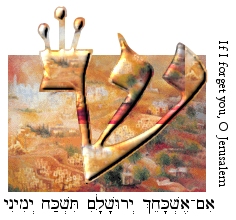|
January 2009 Updates
The Significance of the Moon...

[ The following provides additional commentary to week's Torah reading (Bo). Please read the Torah portion to "find your place" here. ]
01.30.09 (Shevat 5, 5769) Whenever I can, I try to catch a glimpse of the moon. Last night I had the privilege of seeing its thin silver crescent riding upon the winter night's black horizon - a moment of wonder and beauty. Three stars appeared, a new day...
The calendar of ancient Egypt, like our present Gregorian calendar, followed the course of the sun. The sun symbolized the power of the Egyptian sun god Ra (Re) who was also considered the creator and giver of life in some Egyptian myths. As far back as 2700 BC, Ra was regarded as the great god of heaven, King of all the gods, and lord of the resurrected dead. The daily rising sun was a symbol of creation (or the "eye" of Ra), and the shape of the pyramid is thought represent the descending rays of the sun. The Pharaoh, like the sun, was sometimes called the "son of Ra" and said to oversee everything upon the earth (note: the name "Ramses" can mean "Ra bore him," though it is more likely that Amenhotep II [a name based on the merging of the gods Amun and Ra] was the Pharoah of the Exodus). Interestingly, the Hebrew word for evil or bad is ra' (רַע), and the ayin ha-ra, or "evil eye," might derive from this association. From a "macro" perspective, the call of Abraham out of Mesopotamia (Shinar-Babylonia) can be thought of as the beginning of God's judgment of the religion/mythology of ancient Egypt...

The very first word of the Torah indicates the awareness of the significance of time - "in the beginning..." (Genesis 1:1), and according to Jewish tradition, the very first commandment given to the children of Israel (as a whole) was to sanctify the "New Moon" (Exod. 12:1-2), thereby causing the fledgling nation to depart from the solar tradition of the Egyptians (i.e., Ra worship) and to look to the moon for a new means of reckoning time and seasons.
The sages call the observation of the new moon the "first-born" commandment given to the Jewish people. According to midrash, God himself showed Moses the various phases of the moon so that he could understand what the moon should look like when it is to be sanctified ("reborn").

After the Israelites entered the Promised Land, the sighting of the new moon was established on the basis of eyewitness testimony in a bet din (religious court). When the testimony was accepted, the court declared the new moon as "sanctified." The first day of the new month (or the last day of the previous month together with the first day of the new month) was called Rosh Chodesh ("head of the month") and additional sacrifices were offered at the Mishkan/Temple (Num. 10:10). Regarding the Temple, David said, "Behold, I am about to build a house for the name of the LORD my God and dedicate it to him for the burning of incense of sweet spices before him, and for the regular arrangement of the showbread, and for burnt offerings morning and evening, on the Sabbaths and the new moons and the appointed feasts of the LORD our God, as ordained forever for Israel" (2 Chron. 2:4). Since the destruction of the Second Temple, Rosh Chodesh is considered a minor holiday, and the sighting the new moon is sometimes celebrated with "Kiddush Levana," an evening blessing that sets apart the new moon and petitions God for prosperity in the month ahead.
The moon's regular repetition of cycles suggests both change and renewal, wonder and mystery. The Hebrew word for month (chodesh) is related to the word for new (chadash) as it the word for renewal (chidush). God wanted Israel to look to the moon as their timepiece. Just as the moon wanes and disappears at the end of each month, but returns and waxes again to fullness, so we suffer until the return of our beloved Mashiach Yeshua, who will restore the glory of God fully upon the earth.

One final thought. In Colossians 2:16-17 the Apostle Paul writes, "Therefore let no one pass judgment on you in questions of food and drink, or with regard to a festival or a new moon or a Sabbath. These are a shadow of the things to come, but the substance belongs to Christ." But what does verse 17 mean? The Greek text reads: ἅ ἐστιν σκιὰ τῶν μελλόντων, τὸ δὲ σῶμα τοῦ Χριστοῦ, but note that the shadow (σκιὰ) is of things to come (τῶν μελλόντων) - i.e., apparently in reference to the future (at the time of writing). The word translated "substance" (σῶμα) is perhaps better rendered as "body," and may refer to the body the Messiah, i.e., the followers of Yeshua... In light of this, are we supposed to recognize the new moon or not? Well, since we are not under the terms of the Sinai covenant but the New Covenant, the short answer is that we are not obligated to observe this appointed time any more than we are obligated to keep kosher law, sacrifice a sheep during Passover, or make special provision for the Sabbath (Rom. 14:5-6). However, according to the prophet Isaiah, in the Millennial Kingdom people will observe Rosh Chodesh: "It shall happen, that from one Rosh Chodesh to another, and from one Shabbat to another, shall all flesh come to worship before me, says the LORD" (Isa. 66:23), and the prophet Ezekiel also mentions Rosh Chodesh in the coming Millennial Temple (Ezek. 46:1-7). In other words, there is an eschatological dimension to the New Moon and it is therefore part of our future with the LORD God of Israel. Yeshua the Mashiach - the same yesterday, today, and forever (Heb. 13:8).
Despite the schemes of the princes of the world and troubles of the world's economy, we live without fear, understanding that elyon lemalkhei-aretz (עֶלְיוֹן לְמַלְכֵי־אָרֶץ) - the "Ruler of the princes of the earth" (Rev. 1:5) - has ALL things in His hands - including our financial well-being.... I sincerely wish you all Shabbat shalom, chaverim...
 |
Being a Jew inwardly...
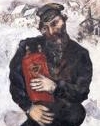
[ The following provides additional commentary to week's Torah reading (Bo). Please read the Torah portion to "find your place" here. ]
01.29.09 (Shevat 4, 5769) Why was the death of the firstborn (makkat bechorot) considered the ultimate plague that God brought upon Egypt? After all, the other nine plagues were terrible in consequence and clearly demonstrated God's justice and power. So what's the significance of the death of the firstborn? Is there a deeper message here?
According to some Jewish thinkers, the final plague dealt a deathblow to the ancient institution of "primogeniture," that is, the special status and privilege given to the firstborn son. Consider, for instance, the Torah's narratives about Cain and Abel, Ishmael and Isaac, Esau and Jacob, Rueben and Judah, Manesseh and Ephraim. Or think about the choice of Moses or King David. In each of these cases the firstborn son was "passed over" by God; in each case devotion to God trumped family "pecking order." In other words, the Torah makes the point (repeatedly) that personal godliness is more important than genealogy or genetics. Unlike ancient Egypt, people are not to be given special treatment because of their birth order or their lineage, certainly not before the Master of the Universe who is "no respecter of persons" (Deut. 10:17, 16:9; Prov. 24:23, Rom. 2:11, etc.). "Freedom from slavery" means more than recreating another caste system...
But what about Israel being called the "firstborn son" of God (בְּנִי בְכרִי יִשְׂרָאֵל)? The sages state that this status must be regarded as sacred because of God's promise to the Jewish people, but individually speaking, if a Jew does not keep the Torah or keep faith with the LORD, he will be "passed over" as well... Okay, but what about the selection of the Levites? Were they not "exchanged" for the firstborn sons of Israel because of the sin of the Golden Calf? Yes, but that in itself lends credence to the idea that status as a favored child of God comes through faith and obedience, since it was the Levite tribe that did not lapse in faith by worshipping the idol. Later, of course, the Levites became itinerant teachers in Israel (living in Cities of Refuge), but eventually spiritual leadership was assumed by the Sages who through study and devotion to the Torah became the chosen sons of Israel. By the time of Jesus, personal godliness was recognized as more important than physical lineage or genealogy.
All of this leads to thoughts about the essence of "Jewishness." The word "Jew" (יְהוּדִי) comes from the patronym "Judah" (יְהוּדָה), which derives from a root (יָדָה) that means "to give thanks, laud, or praise." Note that every letter of the Divine Name (יהוה) appears in the word Judah. In Jewish tradition, there are two basic views about the essential character of the Jewish people. First, Rabbi Yehuda Halevi takes an ethnocentric approach by claiming that the Jewish soul is different than the non-Jewish soul, possessing a mystical quality called "segulah." The Jew is therefore ontologically different than the Gentile, possessing a higher-grade soul, etc. This is the "tribalist" mentality that is often embraced in various ultra-Orthodox communities... Maimonides, on the other hand, who was more Greek-minded, states that there is nothing special about the Jewish soul in itself, but only if a Jew keeps the Torah is he worthy of the name, and if not, he is just like a non-Jew. It is the Torah - and the Torah alone - that makes a Jew special and holy.
Rabbi Abraham Isaac Kook (1865–1935), the first Ashkenazi Rabbi of the modern State of Israel, attempted to mediate these views by quoting the Talmud (Sanhedrin 59a):
"You shall therefore keep my statues and My ordinances, which if a man (adam) does, he shall live by them..." (Lev. 18:5). R' Meir interprets that the Torah's choice of the word "human" (adam) means that even a non-Jew who keeps the Torah and mitzvot is as great as the High Priest.
In other words, personal godliness is the issue, not genealogy. Jews cannot rely on their mere inclusion of ethnic Israel for righteousness (though God has promised a future to ethnic Israel). Indeed, if a Jew is ungodly, then a godly Gentile is considered more righteous than they. Once again, individual godliness is more important than ethnic identity or genetics.
The Apostle Paul, of course, said this centuries before these sages:
Circumcision indeed is of value if you obey the law, but if you break the law, your circumcision becomes uncircumcision. So, if a man who is uncircumcised keeps the precepts of the law, will not his uncircumcision be regarded as circumcision? Then he who is physically uncircumcised but keeps the law will condemn you who have the written code and circumcision but break the law. For no one is a Jew who is merely one outwardly, nor is circumcision outward and physical. But a Jew is one inwardly, and circumcision is a matter of the heart, by the Spirit, not by the letter. His praise is not from man but from God (Rom. 2:25-29).
The very first occurrence of the word Torah (תּוֹרָה) in the Scriptures occurs in the verse that says, "There shall be one law for the citizen and for the stranger..." / תּוֹרָה אַחַת יִהְיֶה לָאֶזְרָח וְלַגֵּר (Exod. 12:49). Torah - in terms of general instruction regarding the will of God was always meant to be for all people...
Finally, what do we make of the idea that ethnic Israel is called the "first born" of God (Exod. 4:22)? Well, despite the fact that "Jewishness" is a matter of the heart - not of genetics - there are still prophetic promises given to the physical descendants of Abraham, Isaac, and Jacob to inherit the land, to be supernaturally preserved as a people, and to be recipients of the Millennial Kingdom of God on the earth. The LORD has always had a remnant of Israel (she'arit Yisrael) that has believed in Him - and this remnant today includes those Jews who have accepted Yeshua as their Messiah (i.e., Messianic Jews). But the Hebrew prophets are explicit: There awaits a glorious future yet to be fulfilled for ethnic Israel. Jesus confirmed this when He said He would return to Jerusalem at the end of the "End of Days." As the Apostle Paul said: "And in this way all Israel will be saved, as it is written, 'The Deliverer will come from Zion, he will banish ungodliness from Jacob'" (Rom. 11:26).
So what might all this mean for you? If you are someone who trusts in Yeshua as your Savior and Israel's Mashiach, then you share the heritage and glory of Israel -- regardless of your genetics or geneaology. By faith you are grafted in to the covenants, blessings, and promises given to the "commonwealth of Israel." As Paul says, you are no longer an "alien" or "stranger" to God's family but can call upon the LORD God of Israel as your God (Eph. 2:12). As a follower of the Jewish Messiah, you are now made a "Jew inwardly" with a circumcised heart (Rom. 2:29, Col. 2:11). You understand that God will not forsake His covenant promises to the descendants of Abraham, Isaac, and Jacob, and therefore you have an abiding love for the heritage and future of the Jewish people.
 |
Hardening of Heart...
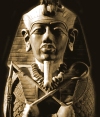
[ The following provides additional commentary to week's Torah reading (Bo). Please read the Torah portion to "find your place" here. ]
01.28.09 (Shevat 3, 5769) The term hashgacha (הַשְׁגָּחָה) is sometimes used to refer to God's providential decrees. A midrash says, "God appoints an angel and tells it to cause a blade of grass to grow. Only then does that tiny blade flourish" (Bereshit Rabbah). There are no coincidences in God's universe; no "butterfly effect" apart from His hand.
In Jewish theology, there is elaborate discussion about how God's decrees (gezerah merosh) do not violate man's free will (bechirah chofshit). In general, the sages decided that hashgacha refers to events we can't control, whereas it's our responsibility to make godly choices. This compatibilism became enshrined in the maxim: "Everything is foreseen by God, yet free will is granted to man" (Pirke Avot 3:19).
 |
Though this idea of reconciling God's omniscience and human freedom may seem paradoxical, the Scriptures actually go further and state that God's decrees can overrule human decision entirely. "The king's heart is a stream of water in the hand of the LORD; He directs it to whatever He wishes" (Prov. 21:1).
During the account of the Exodus, in several places the Torah says that the LORD "hardened Pharaoh's heart" (וַיְחַזֵּק יהוה אֶת־לֵב פַּרְעה) so that he would not change his mind and set the Israelites free. How do we make sense of this idea? Does this imply that people do not have free will (בְּחִירָת חָפְשִׁית) after all?
The midrash (Shemot Rabbah) notes that God indeed hardened Pharaoh's heart, but only after the despot had already hardened it by refusing the message of the first five plagues (Exod. 7:22, 8:15, 8:19, 8:32, 9:7). After the sixth plague, however, the text reads, "And the LORD hardened Pharaoh's heart" / וַיְחַזֵּק יהוה אֶת־לֵב פַּרְעה (Exod. 9:12). Notice that the word "hardened" comes from chazak (strong), suggesting that Pharaoh's will was made more resolute, defiant and obstinate.
Such hardening of heart is a form of punishment (or correction). If someone refuses to submit to God and strengthens his or her resolve to do so, God may ratify the person's decision and foreclose repentance for a season... As Shemot Rabbah 13:5 says:
The Holy One, blessed be He, gives someone a chance to repent, and not only one opportunity but several chances: once, twice, three times. But then, if the person still has not repented, God locks the person's heart altogether, cutting off the possibility of repentance in the future.
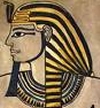
Proverbs 28:14 says, "Happy is the man who fears always, but the one who hardens his heart will fall into evil." If we find ourselves opposing God, our punishment might be prolonged through the process of hardening. This is the phenomenological aspect of our own inward rebellion. Often we are not conscious of it within ourselves, and then -- when we are made conscious -- we find ourselves helpless to change our direction. The sages wrote, "God leads men along a path which they themselves choose. If a man wants to be good, God leads him toward goodness; if he wants to travel an evil road, God helps him do that, too." "The heart of a man plans his way, but the LORD establishes his steps" / לֵב אָדָם יְחַשֵּׁב דַּרְכּוֹ וַיהוה יָכִין צַעֲדוֹ (Prov. 16:9).
What the sages perhaps overlooked is that the hardening of heart can eventually lead to a sense of brokenness and despair -- i.e., the realization that the strength of own self-sufficiency is proven to be of no avail. Turning to the LORD in despair of ourselves is a mark of humility. When we are emptied of ourselves, we are delivered from pride and thereby enabled to confess our need for God's help... This is a miracle, since most of us have "a little Pharaoh inside," clamoring that we be the center of our universe and refusing to submit to the Presence of the LORD...

Finally, it should be remembered that the Apostle Paul addressed this very question in the Book of Romans (chapter 9). When discussing God's sovereign election of Israel, Paul quoted the prophet Malachi who wrote, "Jacob I loved, but Esau I hated" (Rom. 9:13, Mal. 1:2-3). This, of course, refers back to the ancient struggle within Rebecca's womb, the prophecy that the "elder shall serve the younger," and the blessing Jacob received from Isaac (see parashat Toldot). Though Esau and Jacob were not yet born and had done neither good nor bad, God sovereignly chose Jacob to be the recipient of the divine blessing (Rom. 9:11). Paul anticipates the objection that God's love seems rather arbitrary by rhetorically asking whether God is unfair in this matter of election (ἐκλογὴν). By no means, he insists, and refers back to the revelation of the Divine Name given to Moses (Exod. 33:19): "I will be gracious to whom I will be gracious, and will show mercy on whom I will show mercy" / וְחַנּתִי אֶת־אֲשֶׁר אָחן וְרִחַמְתִּי אֶת־אֲשֶׁר אֲרַחֵם (Rom. 9:15). "So then it depends not on human will or exertion, but on God, who has mercy." Paul then applies this principle to the case of Pharaoh by quoting Exodus 9:16, a verse from this week's Torah: "For this purpose I have raised you up, to show you my power, so that my name may be proclaimed in all the earth" (cp. Rom. 9:17). Paul concludes: "So then he has mercy on whomever he wills, and he hardens whomever he wills."

Paul anticipates the problem of our self-sufficiency (i.e., "hardheartedness") in this matter. Again he rhetorically asks, "Why does God still find fault? For who can resist his will?" In other words, if God hardens a person's heart, how can God find fault with the person's hardened condition? Paul then quotes the prophet Isaiah: "Woe to him who strives with him who formed him, a pot among earthen pots! Does the clay say to him who forms it, 'What are you making?' (Isa. 45:9). In other words, it is the prerogative of the Divine "Potter" to use the same "lump of clay" to create some people for "honored use" and others for "dishonorable use." If God wants to show his wrath and make His power known to some people (as He did with Pharaoh) for the purpose of making His glorious mercy known to others (as He did with Israel), then that is His business. But for those who are called, both Jew and non-Jew, this constitutes a glorious promise: "Those who were not my people (Lo-Ammi) I will call 'my people' (Ammi Attah) and her who was not beloved (Lo-Ruchama) I will call 'beloved'. And in the very place where it was said to them, 'You are not my people' (Lo-Ammi attah) there they will be called 'sons of the living God' (b'nei El-chai)" (Rom. 9:25-26; cp. Hos. 2:23, Hos. 1:10).
God has always had a remnant of Israel (she'arit Yisrael) that were His own; just as He has chosen some among the Gentiles to become part of His glorious kingdom of the redeemed. Both groups are sovereignly "grafted into" the Olive Tree of Israel, made "one new man" in Messiah, and are co-heirs of God's glory.
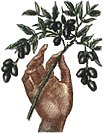
Inclusion in the Kingdom turns on our heart's response to Yeshua the Messiah, the true Lamb of God (seh ha-Elohim). Yeshua came and shed His blood on the cross so that we can partake of the greater Exodus from slavery to this world and bondage to sin. We apply the blood to the "door posts" of our heart through faith, thereby escaping the Angel of death and wrath of God (2 Cor. 5:21, John 3:36). Paul again quotes the prophet Isaiah: "Thus says the Lord God, 'Behold, I am the one who is laying as a foundation (יְסוֹד) in Zion, a stone (אֶבֶן), a tested stone (אֶבֶן בּחַן), a precious cornerstone (פִּנַּת יִקְרַת), of a sure foundation: The one who believes (הַמַּאֲמִין) will not be in haste (i.e. will not panic or fear)" (Isa. 28:16, cp. Rom. 9:33). Yeshua is Rosh Pinnah (ראשׁ פִּנָּה) - the chief cornerstone of God's Temple made without hands (John 2:21). Those who belong to Him are called out from the world by the Father Himself (John 10:27-30; 15:16). Salvation is a gift of God, not based on personal merits -- just as it was given to the Jews in Egypt (Eph. 2:8; Titus 3:5). In the case of the Israelites in Egypt, God dramatically intervened, instituted the Passover, and the people were delivered. All this was meant to foreshadow the greater deliverance that would include the entire world: God intervened, died on the cross, and gives spiritual deliverance to all who call on His Name. Paul later quotes the prophet Joel, כּל אֲשֶׁר־יִקְרָא בְּשֵׁם יְהוָה יִמָּלֵט / "Everyone who calls on the name of the Lord will be saved" (Rom. 10:13, cp. Joel 2:32). The Lord is Yeshua - YHVH in the flesh - King of the Jews.
I began this discussion with the question of what the Torah means when it says that "God hardened Pharaoh's heart." After looking at some traditional Jewish views on the subject, I considered the Apostle Paul, surely the greatest Torah sage of his day, and his words in Romans 9. In light of the Torah, Paul understood the Exodus and the hardening of Pharaoh's heart as part of God's greater sovereign plan for the ages, especially for ethnic Israel. Paul was unapologetically a believer in divine election (ἐκλογὴν) and predestination (προορίζω), though these concepts were broadened to make room for the Gentiles who trust in the Jewish Messiah. In the end, there will be one Olive Tree, one Israel, one flock, one people of God -- though in terms of human history, this plan is still being worked out.... The "church" constitutes those who are grafted into the original covenantal blessings and promises given to Israel.
So what application does this all have for those of us of faith? What existential difference does this make? Well, primarily this is a matter of the heart before God. If you are someone who genuinely trusts in Yeshua and His salvation, then you can be assured that you were personally chosen by God Himself to be part of His family. You are now a child of the Living God. You are partaker of Israel: you share the Jewish heritage with the great Jews of history. Most importantly, you can rest in His love and grace and kindness toward you.... Please, for the sake of Messiah, accept that you are accepted.
Intuitively we believe in the utter sovereignty of God. Whenever we confess the Shema and rightfully regard the LORD as the Master of the Universe, we confess that He is the Authority of the universe. When we are on our knees, we confess that God alone sustains all things by the Word of His power (Col. 1:17). We realize that our heartbeat, our breathing, indeed, our very thoughts and words are the result of God's will alone. "Even before a word is on my tongue, behold, O LORD, you know it altogether" (Psalm 139:4). "Your heavenly Father knows what you need before you ask Him," said Jesus.
 |
Here's a pop-quiz question for you. Was Abraham a Jew or a Gentile? He was a Gentile, of course, before he became a Jew. It was brit milah (circumcision) - literally the "Covenant of the Word" (בּרית מילה) - that transformed him into being a Jew. Abraham is also called the father of a multitude, and those who trust in the Mashiach are named among his descendants (Gal. 3:7). A Jew (יְהוּדִי) is one who praises (יָדָה) God in the truth, not merely someone who was born of Jewish parents (Rom 2:29). Circumcision itself foreshadowed a deeper work of the Holy Spirit given to those who would become members of the new and better covenant (Col. 2:11, Heb. 8:6). The issue of salvation centers on Yeshua and your relationship to Him... All other matters are secondary.
Time is short. If you have not already done so, I urge you to call upon the Name of the LORD Yeshua to be saved.... Whether you were born a Jew or not, eternal salvation comes solely through His Name (Acts 4:12).
Parashat Bo - בא

[ The following explores some things in week's Torah reading (Bo). Please read the Torah portion to "find your place" here. ]
01.26.09 (Shevat 1, 5769) The Torah reading for this week is parashat Bo, the third portion of the Book of Exodus. In this portion of Torah, we arrive at the successful conclusion of the LORD's campaign to free Israel from bondage in Egypt. The redemption through the sacrifice of the Passover lamb is the climactic point of the narrative, which immediately follows the outpouring of God's wrath in the form of the ten plagues. The word בּא ("go") and פרעה ("Pharoah") together equal the gematria of משׁיח ("mashiach"), providing a hint of the coming Messianic redemption that was foreshadowed in Egypt.
Regarding the sequence of the plagues, Rabbi Bechaye (11th century, Spain) wrote that they followed one another over a twelve-month period. On Nisan 15 God spoke to Moses from the burning bush and commissioned him to go to Pharaoh. On Nisan 21, Moses told his father-in-law Yitro (Jethro) of his mission and left for Egypt. Near the end of the month of Nisan, Moses immediately went before Pharaoh and warned him to release the Jews. For the next three months (Iyyar, Sivan, and Tammuz), Moses went into hiding. The plague of blood began on the first of Av and lasted seven days. A respite of three weeks occurred before the next plague (frogs). This was the pattern for all the ten plagues (i.e., roughly a plague a month). The last plague - that of the death of the firstborn - occurred in the month of Nisan, a year after Moses first warned Pharaoh (Exod. 4:22-23). The period of the plagues therefore totaled twelve months (Tzenah Urenah).
The story of yetziat mitzraim (the Exodus from Egypt) is to be retold to every generation, and its lessons are to be applied to every age and place. Hence the Passover Seder and its focus on the needs of children. The Hebrew word for "education" is chinukh, a word that shares the same root as the word "chanukah" (חֲנֻכָּה, dedication). We "tell the story so that we may know" that the LORD is God (Exod. 10:2). Education is ultimately devotional. God called the people of Israel to cleave to Him and walk in His ways....
The first commandment given to the nation of Israel (as opposed to patriarchs or individual leaders such as Moses and Aaron) was that of Rosh Chodashim (i.e., the Biblical New Year that begins on the first new moon of Spring). "This month shall be the beginning of months for you" / הַחדֶשׁ הַזֶּה לָכֶם ראשׁ חֳדָשִׁים (Exod. 12:2). Our corporate identity therefore begins with a shared consciousness of time from a Divine perspective. The mo'edim (festivals of the LORD) all are reckoned based on the sacred calendar given to the redeemed Israelite nation. As the psalmist declared: "He made the moon for the appointed times" / עָשָׂה יָרֵחַ לְמוֹעֲדִים (Psalm 104:19). Yeshua followed this calendar, as did His first followers.
Parashat Bo begins with the LORD commanding Moses to go (bo) before Pharaoh to announce further apocalyptic judgments upon Egypt. The purpose of this power encounter was to vindicate God's justice and power (deliverance/salvation) by overthrowing the tyranny of unjust human oppression. Pharaoh's nightmare of "one little lamb" outweighing all the firstborn of Egypt was to be fulfilled.
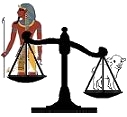
According to midrash, the plague of darkness (i.e, the last plague before the death of the firstborn) lasted six days. During the first three days, the land was dark and it was difficult to breathe. The stars were not visible. During the last three days, the darkness became "thick" and severe. If a person were sitting, he couldn't stand up, and it he were standing, he couldn't sit down. Many "Egyptianized" Israelites who did not want to escape from Egypt with their brothers also died during this plague. Why not seven days of plague, like the previous judgments? The seventh day was reserved for the time when the Egyptians pursued the Israelites at the Sea of Reeds....
Before the LORD administered the final plague - the dreaded makkat bechorot (death of the firstborn) - he instructed Moses to "please ask the Israelites to borrow from the Egyptians gold and silver..." (Exod. 11:12). According to the sages, this request was made so that God's promise made to Abraham would be fulfilled (i.e., that his descendants would escape from their bondage and afterwards come out with great possessions (Gen. 15:13-14)). According to midrash, when Moses announced the final plague, all the firstborn of Egypt gathered and demanded that the Israelites be set free. "Let the people go, for all that Moses speaks is fulfilled." The firstborn then began striking their fathers and took their jewels, silver, gold, etc. -- which they then entrusted to Moses. On the night they were killed by the plague, Moses was left with their wealth. The booty taken by the Israelites was regarded as uncollected wages for hundreds of years of forced labor.
The blood of the korban Pesach - the Passover lamb - was to be smeared on the two sides and top of the doorway, resembling the shape of the letter Chet. This letter, signifying the number 8, is connected with the word חי (chai), short for chayim (life). The blood of the lamb (דַּם הַשֶּׂה) not only saves from the judgment of death, but also is a symbol of divine life:

At the very moment when God "passed over" the houses of the Israelites, all the idols of the Egyptians were destroyed.
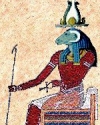
According to the Zohar, the Passover lamb was intended to demonstrate the inadequacy of the Egyptian sheep god (Khnum). The bones of the sacrificed lamb were to be left unbroken and then thrown outside. The Egyptians would then see the bones of their "god" being chewed by dogs....
The Kingdom of Heaven is not the same as the kingdom of man. Judgment is coming upon the world, as it was in the days of Pharaoh. It's just a matter of time... The greater question is whether you are accounted as part of redeemed Israel or as part of the corrupt world system.
Ten Commandments - in Duplicate?
01.26.09 (Shevat 1, 5769) I was recently asked whether the two luchot (tablets) that were inscribed with the Ten Commandements (עֲשֶׂרֶת הַדְּבָרִים) actually had five commandments inscribed on one tablet and five inscribed on the other, as is often represented by traditional Jewish and Christian artwork.

The short answer is, probably not...
In the Mekhilta (an early midrashic collection on Exodus, pseudonymously ascribed to Rabbi Ishmael, 90-135 AD), Rabbi Chanina ben Gamaliel is quoted as saying: "How were the Ten Commandments given? Five on one tablet and five on the other. 'I am the Lord' was written across from 'You shall not murder'... but the Sages say ten [were written] on one tablet and ten [were written] on the other."
The earlier opinion of "the Sages" (i.e., pre-Mishnah interpreters) implies that the Ten Commandments were given in duplicate form, a practice similar (but not identical) to other ancient Near Eastern covenants made between kings and their vassals (e.g., Hittite suzerainty covenants that include a Preamble, Historical Prologue, Stipulations, Curses and Blessings, a ratifying meal, etc.). Unlike the Hittites, however, the covenant made with Israel was made with God acting as King, and the cultural conventions of the era were adopted to define His covenant with Israel. Since there were no other divine mediators/witnesses to this covenant, both tablets (i.e., copies of the contract) were deposited in the Holy Ark (and later at the Temple) to represent the terms of the agreement for both parties (this is unlike other suzerainty treaties that gave one copy to the king and the other copy to the vassal who would store it in a pagan temple to be publicly read on occasion).
Both of these two views (i.e., 5 on each / 10 on each) are maintained in the major midrashic compilation on Exodus (i.e., Midrash Rabbah), though most synagogue artwork represents the later view that the two tablets each had five commandments written upon them. So Jewish tradition accommodates both views, though the earlier view is more likely historically accurate.
 |
Beatitudes in Hebrew...
01.24.09 (Tevet 28, 5769) Tonight I added some additional commentary to the Beatitudes of Jesus in Hebrew page I created the other evening.

The Beatitudes provide a description of life in the Kingdom of Heaven, since to be in the Kingdom of Heaven means to be comforted, to be accepted, to be satisfied, to be shown mercy, to see God, to be called God's own children, and to reign with the Messiah. Although we tend to think of the Kingdom as something future (and therefore remote), each of these blessings is a present possession for the person of faith (and therefore near). Jesus was not expressing ethical idealism as much as he was revealing the lifestyle of those who trust in Him.... As He will go on to say in the Sermon on the Mount, the heart of the law is love, and love is the law of the Gospel...
The Beatitudes of Jesus in Hebrew
01.22.09 (Tevet 26, 5769) Tonight I added the Hebrew text, transliteration and audio recording of the "Beatitudes of Jesus" (i.e., the string of "blessed are..." pronouncements delivered at the beginning of the Sermon on the Mount). The audio recording comes from Abraham Shmuelof (z"l), and I've rendered the Hebrew according to his translation.
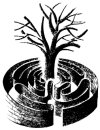
In general it may be said that the Beatitudes imply the transposition of commonly accepted (i.e., this-worldly) values. What is highly esteemed among the world is of little eternal value to God, and conversely, what is of value to God is often scoffed at by the world... This "turning the world upside down" goes along with the scandal of the gospel message itself (σκανδαλον), as the Apostle Paul later remarked: "For the foolishness of God is wiser than men, and the weakness of God is stronger than men" (1 Cor. 1:25).
So we do not lose heart. Though our outer nature is wasting away, our inner nature is being renewed day by day. For this slight momentary affliction is preparing for us an eternal weight of glory beyond all comparison, as we look not to the things that are seen but to the things that are unseen. For the things that are seen are transient, but the things that are unseen are eternal. For we know that if the tent, which is our earthly home, is destroyed, we have a building from God, a house not made with hands, eternal in the heavens. For in this tent we groan, longing to put on our heavenly dwelling ... for we walk by faith, not by sight. (1 Cor. 4:16-ff)
New Hebrew Meditation
01.21.09 (Tevet 25, 5769) I wrote a new Hebrew meditation (Humilty and Awareness) that's intended to remind us that we can always "draw near" to God by humbling ourselves and opening our eyes to the truth about reality. I hope you find it helpful, chaverim....

Parashat Va'era - וארא
01.19.09 (Tevet 23, 5769) The Torah reading for this week is parashat Va'era, the second portion of the Book of Exodus. In a Sefer Torah (Torah scroll), this portion contains exactly 121 verses (p'sukim), 1748 words, and 6,701 letters.

The reading begins:
God (אֱלהִים) spoke to Moses and said to him, "I am the LORD (יהוה). I appeared to Abraham, to Isaac, and to Jacob as El Shaddai (אל שׁדּי), but by My Name the LORD (יהוה) I did not make myself known to them" (Exod. 6:2-3).
This is a puzzling verse, especially since it is apparent that each of the avot (i.e., the patriarchs Abraham, Isaac, and Jacob) called upon the Name of the LORD (see Gen. 12:7-8, 26:25; 28:16, 32:9, 49:18, etc.). Traditionally understood, the sacred Name (YHVH) reveals God's attributes of compassion and immanence, whereas the name Elohim reveals God's attributes of justice and transcendence. According to most of the sages, the Name YHVH is directly revealed in God's compassionate redemptive activity, especially as it relates to Exodus from Egypt. Indeed, consider how the phrase, "I AM THE LORD" (אֲנִי יְהוָה) is directly connected to God's personal revelation and deliverance given to the enslaved Israelites (Exod. 6:6-8):
- "I AM THE LORD (אֲנִי יְהוָה). I will free you (hotzeti) from the burdens (sevalot) of the Egyptians." Note that according to midrash the oppression and slavery stopped on Rosh Hashanah, six months before the Exodus that occurred on Nisan 15. The word translated "burdens" can also refer to "tolerance," "acceptance" or "dragging along," i.e., the psychological state of being a slave (Exod. 16:3). The LORD would free the people not only from physical bondage but also from regarding themselves as slaves.
- "I AM THE LORD (אֲנִי יְהוָה). I will deliver you (hitzalti) from their bondage." This refers to the physical drawing out, snatching away, and escape of Israel from the clutches of Egypt.
- "I AM THE LORD (אֲנִי יְהוָה). I will redeem you (ga'aliti) with an outstretched arm and great judgments." This refers to the ten plagues and especially the Passover sacrifice.
- "I will take you (lakachti) to be My people, and I will be your God. And you shall know that I AM THE LORD YOUR GOD (וִידַעְתֶּם כִּי אֲנִי יְהוָה אֱלהֵיכֶם) who freed you from the burdens of the Egyptians." This refers to the adoption of Israel as God's particular nation and the giving of the Torah at Sinai.
- "I will bring you (heveti) into the land which I swore to give to Abraham, Isaac, and Jacob, and I will give it to you for a possession. I AM THE LORD (אֲנִי יְהוָה)." This refers to the eventual conquest of the land of Canaan and the original covenant promise made to Abraham that his descendants would inherit this land forever.
In this regard the patriarchs did not directly experience the "greater power of YHVH," even though they indeed knew His Name. The Name El Shaddai (as I've written about before) refers to God's sufficiency and care for the fledgling nation, that is, to the families of Abraham, Isaac, and Jacob. Though the first patriarchs called upon the Name of the LORD, they did not directly experience his revelation and saving acts since these were uniquely given to Moses (and to the Israelites) at the time of the Exodus.
It is interesting to note that when Moses and Aaron came to the elders of Israel to announce this news, the Torah reports that the Israelites did not listen to them because of "shortness of breath" (מִקּצֶר רוּחַ). Part of the reason for this (besides the cruel bondage and hard labor imposed on them) was that the Israelites did not know how to calculate the duration of their 400 year exile (as was prophesied to Abraham during brit bein ha-besarim, "the covenant between the parts" in Genesis 15:12-14). According to midrash, 30,000 members of the tribe of Ephraim tried to escape from Egypt some 30 years before the redemption but were all killed by the Philistines (Shemot Rabbah, 20:11). Many of the Israelites then began to lose hope and accept their status as perpetual slaves...
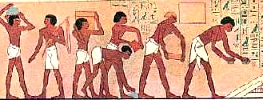
There is an old story of the Magid of Brisk who each year would bring proof from the Torah that the Messiah would come that year. Once a certain Torah student asked him, "Rabbi, every year you bring proof from the Torah that the Messiah must come that year, and yet he does not come. Why bother doing this every year, if you see that Heaven ignores you?" The Magid replied, "The law states that if a son sees his father doing something improper, he is not permitted to humiliate him but must say to him, 'Father, the Torah states thus and so.' Therefore we must tell God, who is our Father, that by keeping us in long exile, he is, in a sense, causing injustice to us, and we must point out, "thus and so it is written in the Torah," in hope that this year he might redeem us." This same principle, of course, applies to those of us who are living in exile and who eagerly await the second coming of the Messiah Yeshua. We should continue asking God to send Him speedily, and in our day, chaverim...
During their initial encounter with Pharaoh, Moses and Aaron said, "Thus says the LORD, the God of Israel (אֱלהֵי יִשְׂרָאֵל), 'Let my people go..." But Pharaoh replied, "Who is the LORD (יהוה) that I should obey him? (Exod. 5:2). The Talmud (Chillin 89a) states that God said to Israel, "I love you because even when I bestow greatness upon you, you humble yourselves before me. I bestowed greatness upon Abraham, but he said to me, 'I am mere dust and ashes' (Gen. 18:27). I did the same to Moses and Aaron, but they said, 'We are nothing' (Exod. 16:8). But the heathen react differently. I bestowed greatness on Pharaoh, and he said, 'Who is the LORD that I should obey Him?'
In the case of Pharaoh (and all those who harden their hearts in pride), God's attribute of mercy (YHVH) is revealed as the attribute of justice (Elohim), whereas for the Israelites (and those who humble themselves), God's attribute of justice would be revealed as the attribute of mercy... When we bless the LORD we "bend" (barekh) our knees before Him. "The prayers of the tzaddikim (righteous) turns Hashem's mind from the attribute of strict justice to the quality of mercy" (Ibn Ezra, Sotah 14).
The Hebrew word Va'era (וארא) means "I appeared" and has a numerical value of 208, the same value as the name Yitzchak (יצחק). This suggests a connection between the Akedah (the sacrifice of Isaac) and the redemption (גְּאֻלָּה) of YHVH that culminated in the original Passover ritual given in Egypt. The ultimate Passover sacrifice of Yeshua as the Lamb of God finally and forever reconciled the attributes of God as Elohim (justice, holiness, transcendence) and God as YHVH (mercy, love, compassion). Only at the Cross of Yeshua at Moriah may it be said: חֶסֶד־וֶאֱמֶת נִפְגָּשׁוּ צֶדֶק וְשָׁלוֹם נָשָׁקוּ - "mercy and truth have met, justice and peace have kissed" (Psalm 85:10).
Recall from last week's Torah (Shemot) how the midwives "feared God and did not do as the king of Egypt commanded them, but kept the male children alive" (Exod. 1:17). Later, despite the persecution and bondage of the Israelites, the Torah notes that because the midwives did so, "God made them houses" (וַיַּעַשׂ לָהֶם בָּתִּים, Exod. 1:21). The sages note that when someone fears a person, they cannot remain calm, because fear is the opposite of being calm. But the fear of Heaven (yirat shamayim) brings calm to the soul. Because they feared God, "He made them houses," implying calm. The fear of heaven eliminates the fear of Pharaoh and his decrees... During the cataclysmic judgments of God upon Egypt, the Israelites dwelt safely in Goshen. Likewise, today we can direct our fear to the proper Source -- thereby finding peace and saftey in the midst of the judgments coming upon the princes of this world... Yeshua prepares a place for us, chaverim....
 |
Torah of Empathy...
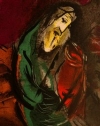
01.16.09 (Tevet 20, 5769) There is an old Chassidic story of two men sitting and enjoying a drink together. One of them then says to the other, "You know, you're my best friend. I really love you, brother!" The other man responds, "Oh yeah? If you really love me, tell me where I hurt..."
The point of this simple story is that we can't really say we love someone without taking the time to know them -- and that means knowing how they suffer. Most of us are suffering, of course, but are we able to transcend our own pain to genuinely empathize with others? Conversely, how many people do we trust enough to to confide our own pains and heartaches? The Law of Messiah (תוֹרת המשׁיח) is to bear one another's burdens (τα βαρη, "weights," Gal. 6:2), and that means making ourselves vulnerable -- and making room inside our hearts for the vulnerability of others. James tells us that personal healing comes from confessing outwardly (εξομολογεισθε) our sins (τας αμαρτιας) to one another so that we may be healed (James 5:16). Of course it's humbling to acknowledge our sins, our failures, and our hurts to another, but without an audience for the inner voice of our pain, we suffer all the more...
If someone loves us, they will know "where we hurt"; and if we love them, we will know where they hurt, too. This same principle can also be applied to our relationship to Yeshua... We take comfort that Yeshua sticks closer to us than a brother, interceding on our behalf and "knowing where we hurt." But if we say that we love him, are we are not claiming that we know him and "where he hurts?" Does Yeshua suffer today? The Apostle Paul wrote: "Now I rejoice in my sufferings for your sake, and in my flesh I am filling up what is lacking in Christ's afflictions for the sake of his body, that is, the church" (Col. 1:24). What is "lacking in Christ's afflictions" is our present sacrifice for the sake of others... Yeshua hungers with those who are hungry, thirsts with those who are thirsty, feels loneliness with those who are abandoned, shivers with those who are cold, weeps with those who are forlorn, is imprisoned with those who are incarcerated, is sick with those who are ill, and so on (Matt. 25:31-ff). Yeshua feels the pain of even the "least of these my brothers." This is where he hurts, chaverim...
The essential difference between the righteous and the unrighteous is revealed in their response shown to those in need. After all, on the Day of Judgment, both the righteous and the unrighteous will account for their choices in light of the selfsame needy and pain-riddled world. The destiny of each person will be determined by whether he or she took the time to genuinely engage the suffering of others... May the LORD help us to share His heart and passion for a lost and hurting world.
Addendum: Time is short, chaverim... We cannot afford the "luxury" of self-deception or resentment to dwell within our hearts any longer. Very soon the wheat will be separated from the chaff.... Yeshua is coming soon! If you haven't experienced the miracle of new life in the Messiah, I appeal to you to turn to Him and ask Him for the gift of salvation today.
 |
Gematria and Midwifery

01.15.09 (Tevet 19, 5769) Yesterday someone asked me a question about Hebrew gematria. For those of you unacquainted with the subject, gematria is an esoteric method of finding relationships between words (and phrases) in the Hebrew text. The basic idea is that since Hebrew letters can be viewed as numbers (Aleph=1, Bet=2, and so on), and since words are obviously formed from the combination of these letters, each Hebrew word can be thought of as a number, and therefore (here's the inferential step) words that share the same numerical value are somehow related.
Here's an example of how gematria works. In this week's Torah reading (Shemot), recall how the Hebrew midwives disobeyed the Pharaoh's evil decree to murder any Israelite boys they helped deliver. When the Pharaoh later asked them why they continued to let the Israelite boys be born, the midwives replied, "because the Hebrew women are not like the Egyptian women, for they are vigorous and give birth before the midwife comes to them" (Exod. 1:19). In the Torah, the phrase "before the midwife comes to them" contains a textual oddity: the word אֲלֵהֶן ("to them") is usually spelled אלהין, and the Talmud (Sotah 11b) suggests that the missing Yod in this word indicates that God Himself functioned as a Midwife to the Israelite women. How do they reach this conclusion? Well first of all Yod represents the Divine Presence (recall how this letter was added to Abram and Sarai's names, among others). Next, using gematria, the value of אֲלֵהֶן is discovered to equal 86 (1+30+5+50) -- the same value as the word אלהים, the word Elohim (God). Now the Hebrew Name Elohim is traditionally thought to represent God in His attribute of justice, and the sages surmised that God directly intervened (as a Midwife) to save the Hebrew babies from the unjust decree of Pharaoh. One implication of this interpretation, by the way, is that the midwives did not, in fact, lie to the Pharaoh. Though they detested his evil policies, they told the truth when they said that that the Israelite women gave birth before they came to them. What they didn't mention, and of course would have made no difference to the wicked Pharaoh, was that God Himself - Elohim - was intervening in this situation as the Creator and Judge of all the earth to deliver the baby boys. Ultimately, of course, this Pharaoh would come to realize this, but not before first experiencing the strong arm of God expressed in the ten plagues upon Egypt. The last plague (i.e., makkat bechorot, the death of the firstborn), you will recall, was divine recompense for the attempted genocide of the Jewish people....
So what are we to make of gematria as a method of interpretation? Well first of all it needs to be stressed that it must always cohere with the pshat (plain reading) of Scripture. In other words, gematria cannot stand alone as an interpretative method. For instance, you will never find in valid gematria some sort of "code" that suggests that there is more than one God, that the ark of the covenant was a radio transmitter, that the Israelites came from another planet, etc. In the example cited from this week's Torah reading, we see that the use of gematria passes this test: it indeed coheres with the truth that God is the righteous Judge who would deliver the Israelites from genocide and slavery... The idea that God was the Midwife of the Israelites -- particularly as it relates to the overall context of the story of the birth of Moses -- likewise agrees with the greater narrative found in the Book of Exodus.
Second, while it is indeed interesting (and sometimes even enlightening) to consider non-linear ways of reading the texts, gematria can never be used as a substitute for the study of the Scriptures in their historical (and literary) context. In Jewish tradition, gematria is considered as a "spice" or additional "seasoning" to the regular study of Torah. The Jewish sages were well aware that heresy often came from those who read the Scriptures out of context... This is part of the reason that the Jewish scholar Rashi -- who stayed close to the text and did not wander off into speculation -- is highly regarded in Jewish tradition.
The best approach is to read the Torah and study the texts in a traditional manner. Check Mishnah/Talmud and other commentaries if you are puzzled. Be sure to read related passages in the New Testament as well, especially those that feature the words of Yeshua our Mashiach. Only after you are clear about the grammatical-historical meaning of a passage should (tentative) exploration be made into other ways of reading the texts. Above all, we must call upon the LORD and ask Him for ruach ha-kodesh to give us His enlightenment. If you ask the Father for bread, He won't give you a stone (Matt. 7:8-11).
Note: I am busy working on a new book on shemot ha-Elohim (the Names of G-d), and I appreciate your prayers to complete this work well.

Thank you, chaverim, and praise the LORD God of Israel with me! His chesed endures forever!
Blood Pressure...
01.13.09 (Tevet 17, 5769) I have been sick the last couple of days, chaverim. My blood pressure has been spiking and my fibromyalgia is also causing sleep problems. Your prayers are appreciated. Thank you.
The Advent of Moses
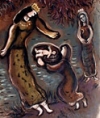
[ Note: The following entry continues my additional commentary on this week's Torah reading (Shemot). Read the earlier updates to "find your place" here. ]
01.12.09 (Tevet 16, 5769) "And Joseph died, being 110 years old. They embalmed him, and he was put in a coffin in Egypt" (Gen. 50:26). So ends the Book of Genesis. Let me wish you Yasher Koach and Chazak! (said upon completing a book of the Torah).
As we proceed to read the "next page" in our chumashim (Bibles), we see that the Book of Exodus picks up right where the narrative of Genesis left off, by listing the "names" (shemot) of the descendants of Jacob who had come to Egypt to settle in the land of Goshen. This (abbreviated) list of names links the two books together by reminding us that while "Joseph died, and all his brothers and all that generation" (Exod. 1:6), embryonic Israel remained within the matrix of Egypt.
Recall that the Book of Genesis described how the "beautiful dreamer" Joseph was betrayed by his brothers, sold as a slave into Egypt, and later falsely accused and imprisoned for years. All this was by divine providence (הֶסְתֵר פָּנִים, "hiding of the face"), of course, since at "just the right time" Joseph correctly interpreted the dreams of Pharaoh, and this in turn led to his promotion as Egypt's chief administrative overseer. Joseph then revealed his identity to his brothers and brought his family to settle in the land of Goshen to escape the seven years of famine. After the famine had passed, Joseph was hailed as a great prince of Egypt who had delivered the nation from destruction. These were happy days for Israel in Egypt: the Israelites were fruitful and "multiplied so much that the land was filled with them" (Exod. 1:7).
Eventually, however, the memory of Joseph's salvation of Egypt faded, and then a "new king" arose over Egypt who "did not know Joseph" (לא־יָדַע אֶת־יוֹסֵף). There is a dispute in the Gemara as to whether this Pharaoh was an unnamed successor of the former regime or the same Pharaoh who knew Joseph but later decided to no longer acknowledge Egypt's indebtedness to the Israelites. Either way, the phrase is ominous. Indeed, whenever a "new king arises" it usually forebodes evil for the Jewish people. "Better the devil you know than the one you don't," says the old Yiddish proverb. Do you remember this scene from the Fiddler on the Roof? The young man Labish approaches the dear and wise old Rabbi and asks him, "Is there a proper blessing for the czar?" Everyone is astounded at the idea. A blessing for the czar? The gentle Rabbi responds that indeed there is indeed a proper blessing for the czar: "May God bless and keep the Czar -- far away from us!" (Amen!)
This "new king" grew wary over the population explosion of the Israelites and feared that they would become a "fifth column" against Egypt during a time of war. Since he "did not know Joseph" (i.e., mistrusted the very idea of "Israel"), this Pharaoh sought to put the Israelites firmly under his political foot by tricking them into becoming Egypt's slave class. In this connection, the statement, "the Egyptians made the children of Israel to serve with rigor," the sages say that the word b'farekh (בְּפָרֶךְ) could be understood as b'fah rekh, meaning, "with a soft mouth" or with gentle speech. This explains Pharaoh's phrase, "let us deal wisely (or shrewdly) with them" (Exod. 1:10). Pharaoh at first made stirring patriotic speeches asking for volunteers to help build new cities for the "glory of Egypt." He even molded bricks with his own hands and began to lay them as foundation stones. Thousands of people came forward asking to help with the new building projects -- including the Israelites. Indeed, the Israelites worked hard to demonstrate their fervent patriotism and strong work ethic. But soon the Pharaoh issued a proclamation requiring that each Israelite repeat the work he had done the day before. The bait had been set - and taken - and the Israelites soon found themselves seduced into slavery.
Slavery is an unspeakably ugly thing. Indeed, in our world today there are more people bought and sold into slavery than ever before in human history. Often it begins with seduction of some kind - cajoling words, false promises - and then comes the threat of force.... It is always dehumanizing and morally wrong to lie and manipulate others - and that statement applies equally to "respectable" political leaders, scientists, educators, as well as to religious hucksters, advertisers, propagandists, unscrupulous business executives, con-artists, panderers, extortionists, or other types of "pimps" found in the world. The Hebrew word shemot means "names," and reminds us that people are never to be considered objects to be exploited. God knows our names, chaverim, and therefore He knows the names of all those who enslaved by others (as well as the names of those who exploit and abuse others, too).
According to Midrash, some time later this "new king" (Pharaoh) had a nightmare. In it he saw an old man standing before him as he sat on his throne. The man held a balancing scale. All the elite of Egypt were placed on one side of the scale, and only a small lamb on the other. When Pharaoh looked, behold, the lamb outweighed all the others!

When he awoke, Pharaoh called his wise men and asked them to interpret his dream, but they could not do so. Only a magician named Balaam ben Beor had the explanation: "A child will be born to the Israelites who will destroy the land and kill all the people," he said. "Then he will lead the Israelites to freedom. You must stop this from happening!" Pharaoh's stargazers agreed with Balaam and informed Pharaoh that according to their calculations the child had been born on that very day! "But he is destined to die by water," they said, and an court advisor then recommended that a decree be issued that all newborn Israelite sons be thrown into the Nile river. Pharaoh agreed to idea, and immediately began scheming about how to implement his genocidal program.
When the Pharaoh summoned the Hebrew midwives and instructed them to kill all the Hebrew baby boys, they initially feigned compliance. However they heroically refused to submit to the Pharaoh's decree -- and even deceived him when they were accused of noncompliance later (Exod. 1:15-21). This is an example of the virtue of pikuach nefesh (פּיקוּח נפשׁ) - i.e., the principle that saving a human life is paramount, overriding virtually any other moral obligation or requirement (such blindly obeying governmental decrees or mindlessly telling the truth, regardless of the consequences to others). Note that the Torah states that God rewarded the midwives for their civil obedience to the Pharaoh -- even if that involved acts of deception on their part.
Undeterred, the Pharaoh then issued a new edict to the entire nation commanding all his subjects to spy on the Israelites. If an Israelite woman gave birth to a baby boy, they were to kill him at once; baby girls, however, were exempt from this decree (Exod. 1:22). (As an aside, it is astounding, is it not, how the complicity of "the people" often furthers the plans and designs of wicked rulers? Either by unthinking compliance or by turning a blind eye to the truth... Think of Nazi Germany, for example.) All this treachery is the prelude to the story of the birth of Moses, of course, who was the son of a Levite named Amram and his wife, Yocheved.
After Moses was born, his mother Yocheved attempted to hide him for a few months (again, in defiance of the Pharaoh's decree), but soon realized she could no longer do so. She then placed him in a basket among the reeds of the Nile before anyone could kill him. Her seven year old daughter Miriam stood by and watched to see what would happen to her brother.
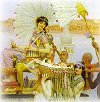
Providentially, Pharaoh's daughter came to bathe in the Nile and discovered the basket among the reeds. Moved by pity, the princess decided to adopt the baby even though he was a "despised Hebrew." Miriam (who witnessed all this) then approached the princess and offered to find a nursemaid for the child - and cleverly arranged for Moses' own mother to do the job! (According to Midrash, as soon as Yocheved placed Moses' basket in the Nile, Pharaoh's advisers came and told him that the foreseen deliverer of the Israelites had drowned, and the decree was rescinded. Pharaoh's own daughter also appealed to Pharaoh to reverse the evil decree.)
When the child was weaned, Yocheved brought him to Pharaoh's daughter and he became her son, a prince of Egypt. She named him Moses (מֹשֶׁה), "Because," she said, "I drew him out of the water" (a play on the word מָֹשָׁה, which means "to draw out, to save"). Thus we see that Moses was actually named by an Egyptian princess.
Moses never forgot his identity as an Israelite, however. Doubtlessly this was something the Egyptian court reminded him of regularly, perhaps to show their "liberality" in treating a "despised Hebrew" as an honored Egyptian rather than as a slave. When he became a man, however, Moses went to see for himself what kind of life his relatives lived. It was then that he killed the Egyptian taskmaster who was abusing his cousin and was forced to flee to Midian for 40 years of "wandering" in the desert. His carnal haste at becoming Israel's deliverer led him into a life of exile from his people... In Midian, he married the daughter of a local priest (named Tzipporah) and had a son named Gershom (a name that comes from the word גֵּר, "a stranger" and שׁם, "there").
Later, perhaps when Moses was nearly 80 years old, he received the call of God to become Israel's deliverer. וַיַּרְא אֱלהִים אֶת־בְּנֵי יִשְׂרָאֵל וַיֵּדַע אֱלהִים - "God saw the people of Israel - and God knew" (Exod. 2:25). It was then that the Angel of the LORD (מַלְאַךְ יהוה) appeared to Moses in a flame of fire out of the midst of a bush saying, "I am the God of your father, the God of Abraham, the God of Isaac, and the God of Jacob" (אָנכִי אֱלהֵי אָבִיךָ אֱלהֵי אַבְרָהָם אֱלהֵי יִצְחָק וֵאלהֵי יַעֲקב).
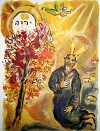
When God instructed Moses to go to the people of Israel to announce their coming deliverance, he began to argue: "What if Israel refuses to believe that You have sent me?" God then gave Moses some "signs" to authenticate his message. Nonetheless, Moses was still reluctant to receive the commission. He protested to the LORD that he was kevad peh - "heavy of mouth" and kevad lashon, "heavy of tongue," and therefore unable to speak on behalf of the LORD (Exod. 4:10).
According to midrash (Shemot Rabbah 1:31), as a very young lad Moses was once seen throwing Pharaoh's gold crown down to the ground. Upon learning of this apparent act of insolence, Pharaoh devised a test to see if the child understood the implications of his actions. He therefore commanded that a platter with a piece of gold and a glowing piece of coal be brought before Moses and ordered the little boy to choose one. If Moses chose the gold, it would imply that he understood its value, and therefore he would be killed. On the other hand, if Moses chose the burning coal, he would be spared since he was unable to differentiate between gold and a glowing piece of coal. Moses began to reach out for the gold when an angel pushed his hand aside and he grabbed the coal instead. Moses then immediately put his hand in his mouth, but that burned his lips and tongue so badly that he had a permanent speech impediment as a consequence.
Despite God's assurances, however, Moses was unsure of his ability to persuade the royal court to let the Israelites go. God then reminded him that He was the Creator of the mouth: "Who makes him mute, or deaf, or seeing, or blind? Is it not I, the LORD? Now therefore go, and I will be with your mouth and teach you what you shall speak" (Exod. 4:11-12). When Moses begged to have someone else take his place, the LORD grew angry and decreed that "because of your words" he would not be permitted to be a kohen (priest), but his brother Aaron would (Exod. 4:14-16).
The parashah ends with the former "prince of Egypt" accepting his God-given mission and beginning the trek back to the land of his origin - this time as a "prince of God"! Along the way back, however, God threatened to kill Moses on account of a delay in the circumcision of his son Eliezer (Exod. 4:24). According to the sages, Moses reasoned that God's commandment to go to Egypt was more important than the commandment to perform brit milah on the 8th day of his son's life, and had he performed the circumcision, travel would have been impossible. Therefore Moses thought he was acting righteously. But when Moses failed to immediately perform the ritual at the lodging place along the way (affording the opportunity for healing for his son during the trip), the LORD came to kill him. Tzipporah (Moses' wife) then performed the circumcision but apparently needed to do it twice, as indicated by the phrase: Chatan damim lamulot - You are a bridegroom of blood to me, because of the circumcisions (mulot, the plural form of mulah).
 |
Parashat Shemot - שמות

01.11.09 (Tevet 16, 5769) The Torah reading for this week is the very first of the Book of Exodus, called parashat Shemot. This portion begins directly where the narrative in the Book of Genesis left off, by listing the "names" of the descendants of Jacob who came to Egypt to live in the land of Goshen. The Book of Exodus tells the story of how the family of Jacob became the great nation of Israel.
In English the word "Exodus" ("going out") comes from the title of the Greek translation of the rabbinical name of the book, Sefer Yetziat Mitzraim ("the book of the going out from Egypt"). In the Hebrew Bible this book is called Shemot ("names"), following the custom of naming a book according to its first significant word.
Some of the greatest narratives of all the Scriptures are found in the Book of Exodus, including the Israelites' enslavement and subsequent deliverance with the ten plagues by the hand of the LORD. The ordinance of Passover is given and Moses then leads the people out of Egypt, crossing the Sea of Reeds. The Jewish people arrive at Mount Sinai, where they receive the Torah. While Moses is on the mountain, the people worship a Golden Calf, and a period of repentance occurs until the covenant is reestablished. The remainder of the book describes the details and construction of the Mishkan (Tabernacle).
There are forty chapters in the Book of Exodus (16,723 words, 63,529 letters), divided into eleven weekly readings.
 |
 |
Dealing with Depression

01.09.09 (Tevet 13, 5769) Shalom chaverim... I've grown increasingly depressed the last few weeks or so. Being out of work has been emotionally difficult. My schedule is almost completely turned upside down, since I write/study, etc., late at night, after every one else is asleep. This has also made it difficult for me to find a job, so I feel like I am "spinning my wheels" a bit over here... Anyway, it's a tough economy, as many of you understand, but I am considering trying to find any job I can out there and cutting back on Hebrew4christians work. I don't know what else to do at this point. Your prayers are appreciated, of course, especially for the new baby we are expecting in March.
Thank you -- John
Ephraim and Manasseh - אֶפְרַיִם וּמְנַשֶּׁה

[ Note: The following entry continues my additional commentary on this week's parasha. Read the earlier updates to "find your place" here. ]
01.08.09 (Tevet 12, 5769) When Joseph brought his two sons Manasseh (מְנַשֶּׁה) and Ephraim (אֶפְרָיִם) to his father for a blessing, Jacob told his grandchildren, "You will be counted just as my own children" (Jacob's "adoption" of these boys explains why Ephraim and Manasseh are counted among the twelve tribes of Israel). Joseph then placed Manasseh, his firstborn, opposite Jacob's right hand, and Ephraim opposite his left, but Jacob deliberately crossed his arms and put his right hand on the younger boy's head and his left hand on the older. He then proceded to bless his adopted sons: "The God before whom my fathers Abraham and Isaac walked, the God who has been my Shepherd (הָרעֶה) all my life long to this day, the Angel (הַמַּלְאָךְ) who has redeemed me from all evil, bless the boys; and in them let my name be recalled, and the name of my fathers Abraham and Isaac; and let them grow into a multitude in the midst of the earth..." (Gen. 48:15-16).
When Joseph saw this he was "displeased" and thought his father was perhaps confused. When he tried to forcibly switch his father's hands, Jacob said, "I know, my son, I know" (יָדַעְתִּי בְנִי יָדַעְתִּי). The younger brother shall become greater than the older one - zaro yeyeh melo hagoyim (זַרְעוֹ יִהְיֶה מְלֹא־הַגּוֹיִם) - "his seed shall become a multitude of nations." This statement has become foundational for the "Two House" theology that claims that Christians literally (rather than figuratively) are the ten lost tribes of Israel, though according to Jewish tradition, the greater blessing given to Ephraim was on behalf of Joshua, Moses' successor, who was a descendant of Ephraim that led the children of Israel into the Promised Land after the the Exodus from Egypt. Joshua's command of the tribes of Israel initially made the tribe of Ephraim the centralized power in the land of Canaan.
The tribe of Ephraim is later identified with the "House of Joseph" in the Scriptures, and later geographically controlled the earliest centers of worship in the Promised Land: Shechem and Shiloh. When the Ark was removed from Shiloh to Jerusalem during the time of King David, seeds of animosity were sown and Ephraim grew "jealous" of Judah's growing influence (2 Chron. 15:8-11). After the death of King Solomon, civil war caused the United Kingdom to be split into two main groups: the ten northern tribes (led by Jeroboam, an Ephraimite, who established rule at Shechem (1 Kings 12:25)), and the two southern tribes of Judah and Benjamin (led by Rehoboam, who ruled from Jerusalem).
Later on, the tribe of Ephraim so dominated the other northern tribes that it became synonymous with the Northern Kingdom of Israel itself, especially in the writings of the prophets. Eventually, after repeated prophetic warnings about the prevalence of "Baal worship," the Northern Kingdom was conquered by the Assyrians (c 722 BC), and the tribes were exiled. This has led to the idea of the "ten lost tribes" of Israel and the rise of various groups that have claimed that since Joseph's wife (Asenath) was an Egyptian (i.e., a Gentile), Ephraim metaphorically represents the "Gentile children of Israel." This viewpoint is now sometimes taught as the "Two House" movement, which uses the allegorical method of interpretation to (ironically) create a new form of "Replacement Theology"-- but this time in reverse (i.e., Israel replaces the Church).
Note: On Shabbat (and during a Brit Milah ceremony) it's customary to bless our sons with the blessing: יְשִׂמְךָ אֱלהִים כְּאֶפְרַיִם וְכִמְנַשֶּׁה - ye'simcha Elohim ke'Efrayim ve'khe-Menasheh - "May God make you like Ephraim and like Manasseh." This comes from Moses' comment regarding Jacob's blessing imparted to his adopted sons: "By you Israel will pronounce blessings, saying, 'God make you as Ephraim and as Manasseh'" (Gen. 48:20). Some of the sages have said that since these boys were born away from the Promised Land (and therefore never directly knew their grandfather Jacob), they represent Israel in exile, and the blessing is one of preservation for the Jewish people. Figuratively, as "adopted sons of Israel" and partakers of the covenants given to the Jewish people (Eph. 3:6), Christians can take comfort using this blessing, too.
 |
Dealing with theological bias...

[ Note: The following entry is another follow up to my article, "Is Christianity anti-Jewish?" For more information, please read the article... ]
01.07.09 (Tevet 11, 5769) Today a Christian friend wrote to me regarding my recent article, "Is Christianity anti-Jewish?" and admonished: "Be careful about strong criticisms of others' hermeneutical assumptions. We are often guilty of what we criticize others about."
Now as a point of human psychology, his point is well taken. We often see faults in others that we ourselves have. But I wonder, in this case anyway, whether his accusation was entirely fair. After all, it wasn't my intention to focus so much on particular individuals as it was to suggest that the Western Church's habitual use of the "allegorical method" has resulted in an institutionalized prejudice that expresses itself as an anti-Jewish bias.
Taken to its extreme, however, this person's admonishment suggests something that seems characteristic of Christian culture, namely, that we should not question authority figures, since doing so is unloving... But is this assumption true? Is it always unloving to criticize and correct others? Jesus' teachings often corrected the theological errors and assumptions of his listeners, yet we would hardly suggest that he was unloving for doing so.... On the contrary, how would it be loving to opt-out from genuinely engaging others by taking a "live and let live" attitude? If you knew someone who believed that "God told him to" jump off a bridge, would it be unloving to attempt to stop him? Indeed, there is a time for anger when we "earnestly contend" for the faith. Jesus overthrew the moneychangers tables at the Temple... The problem isn't whether we might appear unloving toward authority figures, but rather how to discern which ones we should really trust. "Testing the spirits" requires that we make some judgments....
But aren't we supposed to be nonjudgmental people? "Judge not that you be not judged," said Jesus. Not exactly. Jesus also warned us not to judge by appearances, but "judge with righteous judgment" (John 7:24). In the context in which he spoke (i.e., teaching the crowd during the festival of Sukkot in Jerusalem), Jesus justified healing someone on the Sabbath day as an example of understanding the "weightier matters" of the Law. Jesus' appeal to the crowd was to think things through -- and then come to a decision. He was not advocating that people "turn off their brains" and accept the authority of the religious establishment of his day, -- rather quite the contrary....
Am I then guilty of holding to a set of interpretive assumptions? Of course. I don't pretend to be exempt from the universal problem of reading Scripture with bias, and indeed, it's psychologically impossible to be "assumption-less" when it comes to interpretation. The point of my brief article, however, was simply to identify some interpretative biases at work in Western Church tradition that have led to anti-Jewish sentiment and to argue that a grammatical-historical approach to reading the Scriptures avoids this outcome. I plainly confess that I hold to a strong bias that God will honor his promises made to ethnic Israel by one day establishing the Millennial Kingdom in Jerusalem. Israel is not so much a part of the church's future as the church is part of Israel's future. Mea culpa. If that's the issue, then we can discuss it -- and how I reached this conclusion using my own interpretative assumptions, but simply suggesting that I am guilty because I engaged in critical thinking is a distraction that ignores the point at issue...
Should we unquestioningly accept the interpretation and thinking of theologians because they are part of a "priestly class" or otherwise given divine prerogatives? Well, we should "give honor to whom honor is due," and when people have "done the work" of thinking hard about certain theological issues they should be genuinely listened to and respected (just as we respect other authorities in different studies). But saying this doesn't mean that their conclusions should be categorically accepted. With all due respect, once a declarative statement is made it becomes part of the "public square" and is open to discussion and dialog -- regardless of the originating source (authority) of the statement. Some authorities are more qualified than others, of course (e.g., just because a famous movie star says a brand of toothpaste is better doesn't mean that your teeth will sparkle more by using it), but ultimately there comes a point of decision that is our own personal responsibility....
In general, the path to such decision tends to be more "interactive" in Jewish tradition than in Christian tradition. The idea of the "Oral Law," the give-and-take reasoning of the Talmud, and the regular practice of communal dialog is more open-ended and less dogmatic in its approach. For example, Christian preachers tend to argue their points in soliloquy from the pulpits, and Sunday School classes tend to indoctrinate rather than explore the issues. Unlike Christianity, most Jews do not subscribe to technical creedal formulas or take catechism classes....
There is a story about an agnostic Jewish man who regularly attended Bet Midrash (a Jewish learning center) only to argue and pick apart the conclusions of those who studied there. One day, the rabbi had enough and went to talk with the man. "Moishe, why do you come here only to argue with others? If you don't believe, wouldn't you be better off not coming here? Why go through all the aggravation?" The man replied, "What, am I a Gentile that I shouldn't come here?" And that was enough for the rabbi. Despite his questions, Moishe was a Jew and therefore a welcome part of the community.
I hope you don't miss my point here. I am not suggesting that we all question things indefinitely and live as theological skeptics. No, "following Jesus" means (among other things) accepting his teaching as authoritative and living it out with passion. The point I'm trying to make is that the search for truth is an ongoing affair. We must "study to show ourselves approved to God" - and that means asking questions, reading what others have said, and dialoging with others to help form our own conclusions. Sometimes this involves "earnestly contending for the faith" as part of the journey. "Go into all the world and make disciples (talmidim - students)..." - but a teacher cannot give away what he doesn't yet have. We are all learning, but our "doctrine" should not trump our relationships...
Finally, it should be obvious that the article I wrote was a cursory examination of quite complicated issues. It was meant to provoke some of you to rethink your assumptions about the Jewish people and Israel. To write seriously about this subject would require hundreds of pages filled with original source quotations, footnotes, and so on. Shalom, chaverim.
 |
No One Knows the Day or Hour...

[ Note: The following entry continues my additional commentary on this week's parasha. Read the earlier updates to "find your place" here. ]
01.06.09 (Tevet 10, 5769) When the time came for Jacob (Israel) to die, he called all his sons together. According to midrash, Jacob wanted to tell them about the "End of Days" (אַחֲרִית הַיָּמִים) when the Messiah would come, but was prevented by the Holy Spirit. According to the Jewish sages, God prevented Jacob because He does not want anyone to know the "day or the hour" when the great King of Israel would appear...
Why not? Why wouldn't God want to tell his children the hour of the promised Messiah's appearance? According to tradition, if people knew how long they would have to wait, they might despair of life altogether, or, if they knew the exact time, they might "repent" just for that reason, and not because it came from the heart...
On the other hand, as I mentioned yesterday, Jacob's prophecy regarding the coming of the Messiah as a future ruler from the tribe of Judah alluded to the timing of the Messiah's appearance. To review, Jacob prophesied that "the scepter will not depart from Judah, nor the ruler's staff from between his feet, until 'Shiloh' (שִׁילוֹ) comes..." (Gen. 49:10). If the regency of Judah was established in the Jewish Sanhedrin, the scepter (rod of authority) would have departed from Judah in AD 6-7 after the Romans installed a procurator as the authority in Judea. This prophecy, then, would have failed. However, since the Messiah had indeed come and was in their midst as Yeshua mi-netzeret (Jesus of Nazareth) during this time, Jacob's prophecy didn't fail.
Nonetheless, like most prophecies in Scripture, this one has a "dual aspect" or "double fulfillment." The "King of the Jews" (a synonym for the Messiah, called "Christ" by Gentile Christendom) had indeed come "before the scepter departed from Judah," but he went unrecognized since he came to fulfill the role of the Suffering Servant (Mashiach ben Yosef). The second part of the prophecy, "and to him shall be the obedience of the people," is yet to be fulfilled. It will become a visible reality only after his Second Coming, at the end of olam ha-zeh (this present age), when Jesus comes to judge the nations (the "sheep and the goats") and establish the Kingdom of God from David's throne in Jerusalem.
Regarding the Messiah's Second Coming, we therefore find ourselves in the same position of expectation as Israel's sons who heard the original prophecy. Though Jesus told us about the "signs" of the time (and the "fig tree has brought forth its leaves," see Matt. 24:32-33), we do not know the exact "day or the hour" and therefore must be ready for his return at any time (Matt. 24:36-25:13). The Spirit and the Bride say, "Come." Maran ata, Yeshua!
 |
Until "Shiloh" Comes...
01.05.09 (Tevet 9, 5769) The Torah reading for this week (Vayechi) is the final portion of sefer Bereshit (the Book of Genesis) and includes Birkhat Ya'akov - the prophetic blessing of Jacob over the tribes of Israel.

When the time came for Jacob to die, he did not call the designated firstborn of the family (that would be Reuben, who forfeited his status), but rather Joseph, the firstborn to his beloved wife Rachel. Jacob asked Joseph to not be buried in Egypt but rather in the resting place of Abraham and Isaac (i.e., the Promised Land), and he asked Joseph to swear that he would bury him there. As Joseph promised, Jacob "bowed his head" -- an indication that Joseph's dream that his brothers and even his father would bow down to him was fulfilled.
Later, when Jacob convened all his sons together to bless them before his death, he prophesied that "the scepter (שֵׁבֶט) will not depart from Judah, nor the ruler's staff from between his feet, until Shiloh (שִׁילוֹ) comes; and to him shall be the obedience (יקְהָה) of the people" (Gen. 49:10). According to the early rabbis and Talmudic authorities, the "ruler's staff from between his (Judah's) feet" refers to the Messiah (Targum Onkelos, Targum Pseudo-Jonathan, and Targum Yerusahlmi) and the word "Shiloh" comes from she-lo, meaning "that is his." In other words, kingly authority would be vested in the tribe of Judah until the Messiah appears, at which time he would reign as the supreme leader of the people. Others have said that since shiloh has the final Hey with a mappiq as a prepositional function of "to" or "towards," it actually means toward Shiloh, the very first capital of Israel in the Promised Land. In either case, however, the idea has to do with the authority invested in Judah as divine regent until the Messiah appears.
Historically speaking, if we understand the "regency of Judah" to be invested in the Great Sanhedrin (after the last independent King of Judah [Tzedekiah] was deposed), the scepter (shevet) would have departed from Judah in AD 6-7 after the Romans installed a procurator as the authority in Judea (thus replacing the Sanhedrin). However, the prophecy of Jacob did not fail, since the Mashiach had indeed come and was in their midst as Yeshua mi-netzeret (Jesus of Nazareth) at that time. In other words -- Yeshua is indeed the King of the Jews, though at present He is not physically reigning on David's throne (this will occur at His Second Coming when he returns to Jerusalem at the end of olam ha-zeh (this present age) to establish the Kingdom of God upon the earth).
Note: Jacob's prophecy that "the scepter will not depart from Judah... until Shiloh comes" includes all the letters of the Hebrew alphabet except for the letter Zayin, which is the Hebrew word for weapons, suggesting that when the Messiah comes, it will not be by means of arms or weapons, but rather by the ruach ha-kodesh.
 |
Asarah B'Tevet - עשרה בטבת
01.04.09 (Tevet 8, 5769) This coming Tuesday (January 6th on the Gregorian calendar) is Asarah B'Tevet ("the Tenth of Tevet"), traditionally recognized as day of mourning for the loss of the Jewish Temple (Bet Ha-mikdash). Orthodox Jews will fast from sunrise to sunset to commemorate the siege of Jerusalem by Nebuchadnezzar, the King of Babylon (in 587 BC) -- an event that eventually led to the destruction of the First Temple and the 70-year Babylonian Exile of the Jewish people. In Israel, Asarah B'Tevet also marks the day Kaddish (memorial prayer) is recited for people whose date or place of death is unknown. This has resulted in a day of mourning for the many Jews who perished during the Holocaust (in addition to the formal commemoration of Yom HaShoah).
Follow Up to
"Is Christianity anti-Jewish?"
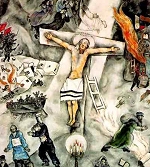
01.03.09 (Tevet 7, 5769) In response to my post about "Is Christianity anti-Jewish?" yesterday (see below), someone asked me how we could help correct the errors of Replacement Theology (and its overarching hermeneutical framework otherwise known as "Covenant Theology"). I answered that this is ultimately God's business, not ours... Only God can open people's minds to the truth and give them the gift of teshuvah (repentance). No amount of reasoning from the Scriptures seems to help, since most advocates of Replacement Theology will use their hermeneutical commitments to reinterpret the texts to their liking. This is similar to the methodology of various cults, including the cult of rabbinical tradition: texts that do not easily cohere with the presuppositions of the theological system are either explained away or invested with meaning that is alien to the intent of the original author (as Jesus once remarked, "Wisdom is justified by her children"). It's disconcerting to listen to various Christian teachers and preachers impugn God's promises made to Israel while claiming to call upon the Name of the same God who made these promises in the first place. What sort of theological madness leads you there?
When someone's theological presuppositions and denominational commitments trump the plain reading of Scripture, it takes nothing less than a miracle to learn to see something from another perspective. Practically speaking, gentle words, a spirit of love and understanding, living out our own heart convictions with sincerity -- this is our best option it seems. And we can (and should) pray for these people, too, that the LORD God of Israel would reveal the truth that Jesus is none other than the King of the Jews....
 |
New Article:
Is Christianity anti-Jewish?

01.02.09 (Tevet 6, 5769) Many of today's church leaders appear to hold views about ethnic Israel that express institutionalized prejudice and an "anti-Jewish" bias. But how did the church get so far removed from the Jewish roots of the faith? Is Christianity essentially anti-Jewish in its perspective?
Today I wrote a brief article ("Is Christianity anti-Jewish?") that explores some of these questions.
The Glory of God...
in the Face of Jesus
01.01.09 (Tevet 5, 5769) Since most of us conventionally recognize the secular calendar system, please let me wish you a Happy New Year, chaverim! It's my heartfelt prayer that the LORD God of Israel will bless you and shine His radiance upon you during this coming year. Unlike Moses -- who veiled his face to hide the fact that the glory of the former covenant of Sinai was indeed fading away -- "we all, with unveiled face, reflecting the glory of the Lord, are being transformed into the same image from one degree of glory to another. This comes from the Lord who is the Spirit" (2 Cor. 3:12-4:1). Each of us, like Moses, ascends the mountain of Zion to behold the Glory of God: "And when they lifted up their eyes, they saw no one but Jesus only" (Matt. 17:8).
Though we are "in but not of" this world (John 17:15), our faith indeed reflects back the shining glory (zohar) of the LORD as revealed in the face of Yeshua:
"For God, who said, 'Let light shine out of darkness (יְהִי אוֹר)' has shone in our hearts to give the light of the knowledge of the glory of God in the face of Yeshua the Mashiach (2 Cor. 4:6).
Let's consider the grammar of this complex and marvelous statement:
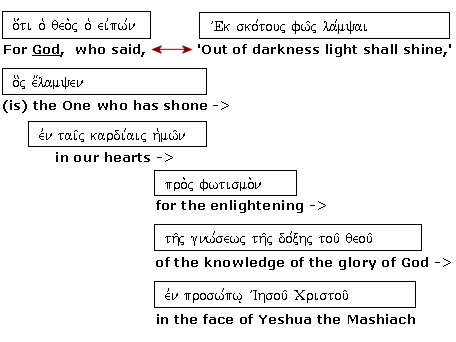 |
The subject of the verse is obviously God (with quote from Gen. 1:3 functioning as an appositive). Next there is the participle "the one who has shone" (ος ελαμψεν), modified by the adverbial phrase "in our hearts" (εν ταις καρδιαις ημων), followed by the purposive clause: "for the enlightening (προς φωτισμον) of the knowledge (της γνωσεως) of the glory of God (της δοξης του θεου) in the face of Jesus Christ (εν προσωπω Ιησου Χριστου). Like the Divine Light created on the first day, God shines within our hearts to enlighten us with the truth that His glory is fully expressed in Yeshua.
"The face of Jesus Christ" is therefore the radiance and glory of God Himself. As the author of the Book of Hebrews puts it, "He (Yeshua) is the radiance of the glory of God and the exact imprint of his nature, and he upholds the universe by the word of his power" (Heb. 1:3). There is indeed a "glory" and grace found in the older covenant, but that glory and grace has been far surpassed by the glory of God as revealed in the face of Jesus...

It is my desire and utmost prayer that Hebrew4Christians will continue to be a resource of unique, grace-based teaching about the the glorious Person of Yeshua our Messiah, with the aim of yielding "scribes who have been trained for the kingdom of heaven... bringing out treasures from what is new and what is old" (Matt. 13:52).
May the LORD open our eyes to behold the glory of God (כְּבוֹד־אֵל) as He shines -- in both the former covenant as well as in the new. Amen.
|
|





































